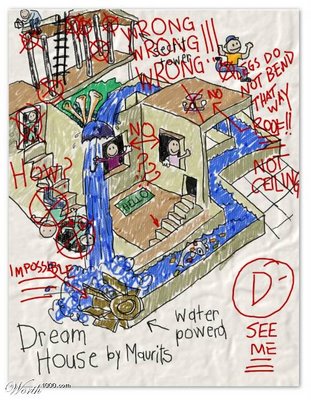Our church, like many others, has been gearing up for the whole Da Vinci event recently. Sermons, guest lecturers, etc., have all come and warned of the herecies and inconsistencies in both the book and the movie.
I remember back when I was in college and the first Gulf War began. I was at Cedarville and there was a learned man who came to speak in one of our daily chapel services to warn us that so many things pointed to the end being near. "Jesus is coming any minute," was his big speach. He scared us all to death, in some ways, making parallels of world events to an interpretation of the last days. At this time too, there were lots of books writen about Iraq as Babylon, all sorts of articles appeared in Christian literature pointing out the parallels.
Then the year 2000. A flip of the calendar, yet somehow we, as the church, needed to be ready for disaster, because that chip with the old date sub routine written in it in the gas meter by our house was gonna explode, even though the date routine was never required of it. More hysteria, more books, more articles, get your canned foods, find shelter, be ready for anything. And a lot of it coming from and for the Christian community.
So now we have Da Vinci, and pardon my cynicism, but where was everybody when Indiana Jones raided the "Lost Ark?" "God-in-a-Box" theology with a great adventure and everything. And the "Last Crusade?" "It's time to ask yourself 'what do you believe?', Dr. Jones..." What? that the holy grail if administered correctly gives healing powers and immortality--but wait, only if you stay behind that line.
What is it that is so new that the Christian community has to study up on because of the release of this book/movie? What skewed biblical principles are being put forth that have not already assulted the Truth of God's word in other writings, books, tv shows and movies for centuries? Why now?
What person, having seen Indiana Jones is going to ask quesitons about God, and eternal life, and the holy grail? What person, after reading or watching Da Vinci is going to start an argument with a known Christian over the elements of the story and their veracity?
Why now is the Christian community suddenly implored to learn how to defend what they believe, when all along, and all around them (us) doctrines of theology and morality have been attacked for years? We are being instructed on how to debunk Da Vinci as though that is the argument to be made. As the fabled story goes (is it true?) bankers learn to identify counterfeit bills not be studying the counterfeits, but by studying the real thing.
So let's ignore the hype and be ready, Da Vinci or not, to be able to defend the reason for the hope found within us.
What do you think?


